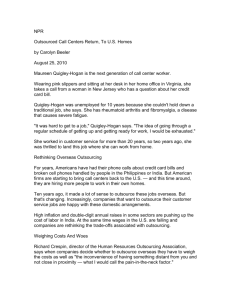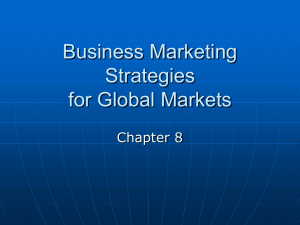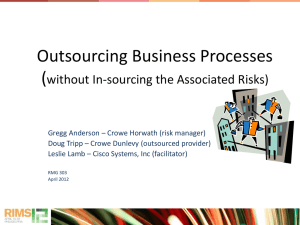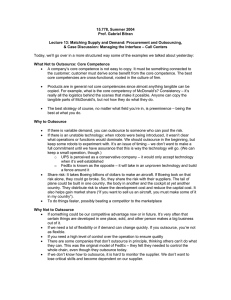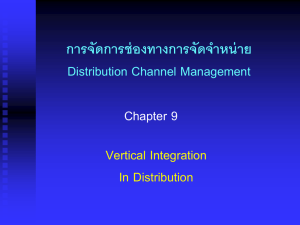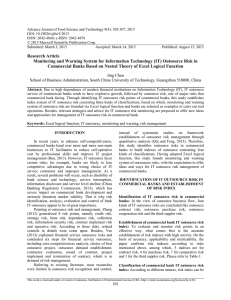Outsource Underwriting 2001 SOA/LTCI Conference A (short term)
advertisement
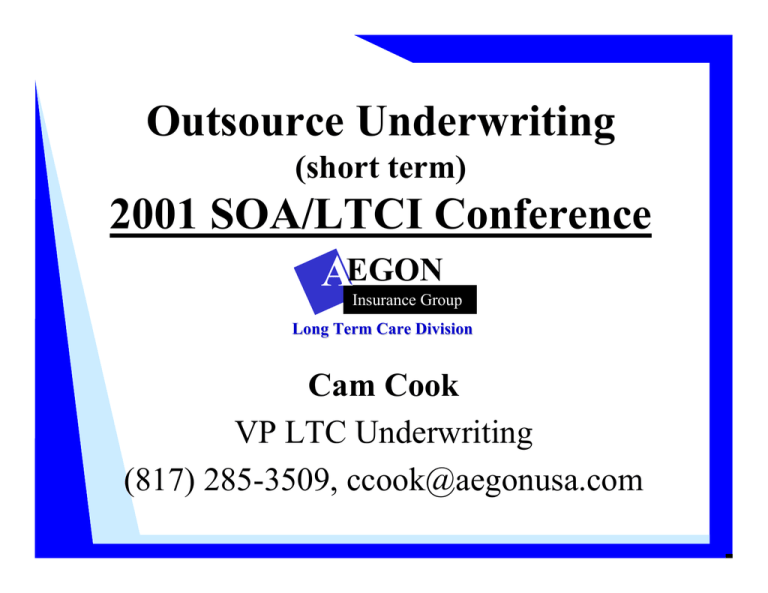
Outsource Underwriting (short term) 2001 SOA/LTCI Conference AEGON Insurance Group Long Term Care Division Cam Cook VP LTC Underwriting (817) 285-3509, ccook@aegonusa.com SHORT TERM OUTSOURCING (2-12 months) • “Bridging” Resource Gaps (6-12 months) • “Crisis” Situations (2-4 months) “BRIDGING” EXAMPLE Workload Exceeds Plant Capacity 1000 900 Apps Per Week 800 Application Received Plant Capacity 700 600 500 1Q 2Q 3Q TIME 4Q 1Q SITUATION ANALYSIS • Company committed to “in-house” underwriting to develop propriety knowledge & competitive advantage. • Growing backlogs, slow service, demoralized staff. • Threatened grow/sale plans. • Concerns about underwriting Quality. • Large number of unproductive junior underwriters • Limited ability to quickly hire experienced LTC underwriters. NEEDS • Increase Plant Capacity NOW! • Refocus senior staff from backlog to development of junior staff’s productivity and quality. • Reduce backlog to improve both sales relations and morale problems without compromising underwriting quality. THE SOLUTION • Outsource sufficient workload to meet the needs. • Do not overestimate your current capacity or speed of developing your staff. ISSUES • • • • • • • • Understanding true needs. Cost: $20 - $40/case. Underwriting standards. Time service implications. Field communications. Selection of Outsource partner. Quality Control. “Wind down” plan. UNDERSTANDING TRUE NEEDS • Develop good plant capacity model. • Create a staff development/productivity plan. • Combine to develop model of outsource needs. COST: ($20 - $40/CASE) • You get what you pay for! • Varies with volume & length of commitment. • I recommend cost should be secondary to quality and service needs. It has a “shorter tail”. UNDERWRITING STANDARDS • Choose between your own and outsource partner’s standards. • I recommend using your own standards. • Why? – Your product is matched to your experience. – Minimizes field complaints. – You have the time to teach your outsource partner. • Share everything with your partner! SELECTION OF OUTSOURCE PARTNER • • • • • Talk to industry friends about options. Clearly outline the nature of your needs. Negotiate cost, service and quality standards. Can they really handle your volume? Due diligence: – Have sample group underwritten (50-100) – Compare to your decisions by categories such as age, impairments, etc. – Discuss differences to improve outsourcer’s knowledge of your standards. • Select partner with best quality. QUALITY CONTROL • Random sample 25% in first weeks. • Reduce sample to 10% after satisfied outsource partner understands standards. • There is a tendency to concentrate on declines. • Do not forget the standard issues. That’s what you live with! • Insist outsource partner does their own self audit. • Set up good spreadsheets to account for all cases (sent vs. completed, time service, decline rates, etc.) TIME SERVICE • Recognize outsourcing adds a few days to the time from “last evidence received” to “policy issued.” • Tell your staff and sales force. Emphasize the benefits: – Higher quality decisions. – Reduced backlog. • Do not do the work twice! • Be realistic! FIELD COMMUNICATIONS • It’s all about TRUST! • Do not hide that you are outsourcing. • Have trusted senior staff review and communicate adverse decisions. • Have regular “status” conferences with your outsource partner. Share all problems and successes. “WIND DOWN” PLAN • Track progress of the productivity improvements in your own staff. Execute, execute. • Remember it’s easy to become dependent. Focus on goal of independence. • Share progress with your staff, it builds pride and morale. • Share progress with outsource partner. CRISIS SITUATIONS (Difference from Longer Term) • Recommend use of Outsource Partners Underwriting Standards. You don’t have time to train them. • In due diligence, increase emphasis of outsource partner’s capacity. They don’t have time or incentive to “ramp up.” • Consider splitting business between several sources to reduce your vulnerability to capacity problems. CONCLUSION REMEMBER, IT’S A PARTNERSHIP. YOU GET OUT WHAT YOU PUT IN!
